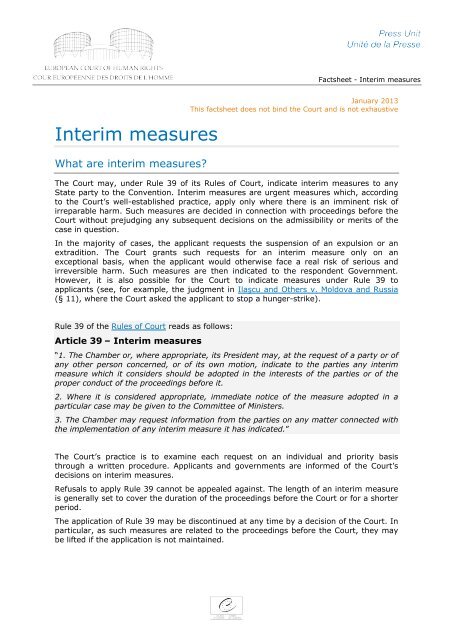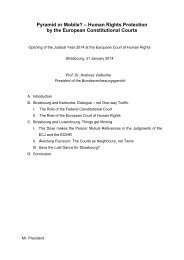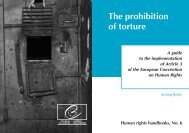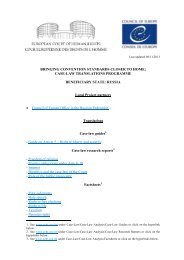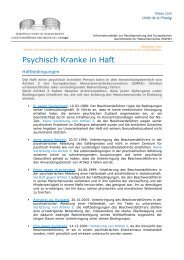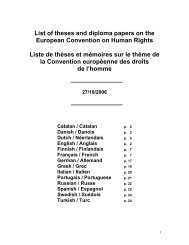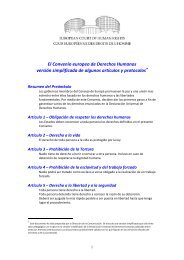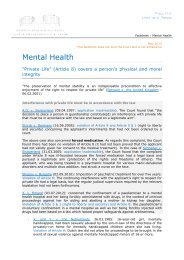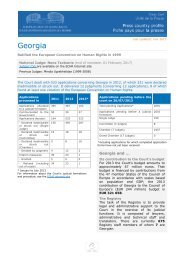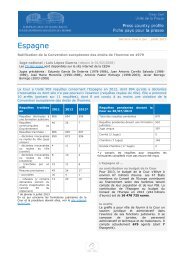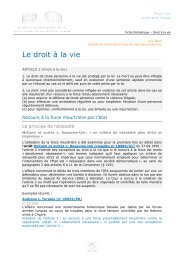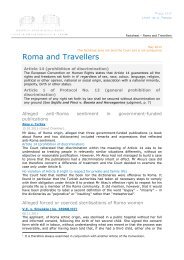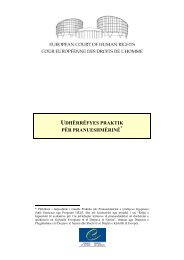Factsheet Interim measures - European Court of Human Rights ...
Factsheet Interim measures - European Court of Human Rights ...
Factsheet Interim measures - European Court of Human Rights ...
Create successful ePaper yourself
Turn your PDF publications into a flip-book with our unique Google optimized e-Paper software.
<strong>Interim</strong> <strong>measures</strong><br />
What are interim <strong>measures</strong>?<br />
<strong>Factsheet</strong> - <strong>Interim</strong> <strong>measures</strong><br />
January 2013<br />
This factsheet does not bind the <strong>Court</strong> and is not exhaustive<br />
The <strong>Court</strong> may, under Rule 39 <strong>of</strong> its Rules <strong>of</strong> <strong>Court</strong>, indicate interim <strong>measures</strong> to any<br />
State party to the Convention. <strong>Interim</strong> <strong>measures</strong> are urgent <strong>measures</strong> which, according<br />
to the <strong>Court</strong>’s well-established practice, apply only where there is an imminent risk <strong>of</strong><br />
irreparable harm. Such <strong>measures</strong> are decided in connection with proceedings before the<br />
<strong>Court</strong> without prejudging any subsequent decisions on the admissibility or merits <strong>of</strong> the<br />
case in question.<br />
In the majority <strong>of</strong> cases, the applicant requests the suspension <strong>of</strong> an expulsion or an<br />
extradition. The <strong>Court</strong> grants such requests for an interim measure only on an<br />
exceptional basis, when the applicant would otherwise face a real risk <strong>of</strong> serious and<br />
irreversible harm. Such <strong>measures</strong> are then indicated to the respondent Government.<br />
However, it is also possible for the <strong>Court</strong> to indicate <strong>measures</strong> under Rule 39 to<br />
applicants (see, for example, the judgment in Ilaşcu and Others v. Moldova and Russia<br />
(§ 11), where the <strong>Court</strong> asked the applicant to stop a hunger-strike).<br />
Rule 39 <strong>of</strong> the Rules <strong>of</strong> <strong>Court</strong> reads as follows:<br />
Article 39 – <strong>Interim</strong> <strong>measures</strong><br />
“1. The Chamber or, where appropriate, its President may, at the request <strong>of</strong> a party or <strong>of</strong><br />
any other person concerned, or <strong>of</strong> its own motion, indicate to the parties any interim<br />
measure which it considers should be adopted in the interests <strong>of</strong> the parties or <strong>of</strong> the<br />
proper conduct <strong>of</strong> the proceedings before it.<br />
2. Where it is considered appropriate, immediate notice <strong>of</strong> the measure adopted in a<br />
particular case may be given to the Committee <strong>of</strong> Ministers.<br />
3. The Chamber may request information from the parties on any matter connected with<br />
the implementation <strong>of</strong> any interim measure it has indicated.”<br />
The <strong>Court</strong>’s practice is to examine each request on an individual and priority basis<br />
through a written procedure. Applicants and governments are informed <strong>of</strong> the <strong>Court</strong>’s<br />
decisions on interim <strong>measures</strong>.<br />
Refusals to apply Rule 39 cannot be appealed against. The length <strong>of</strong> an interim measure<br />
is generally set to cover the duration <strong>of</strong> the proceedings before the <strong>Court</strong> or for a shorter<br />
period.<br />
The application <strong>of</strong> Rule 39 may be discontinued at any time by a decision <strong>of</strong> the <strong>Court</strong>. In<br />
particular, as such <strong>measures</strong> are related to the proceedings before the <strong>Court</strong>, they may<br />
be lifted if the application is not maintained.
<strong>Factsheet</strong> - <strong>Interim</strong> <strong>measures</strong><br />
Scope <strong>of</strong> interim <strong>measures</strong><br />
In practice, interim <strong>measures</strong> are applied only in a limited number <strong>of</strong> areas and most<br />
concern expulsion and extradition. They usually consist in a suspension <strong>of</strong> the applicant’s<br />
expulsion or extradition for as long as the application is being examined.<br />
The most typical cases are those where, if the expulsion or extradition takes place, the<br />
applicants would fear for their lives (thus engaging Article 2 <strong>of</strong> the Convention) or would<br />
face ill-treatment prohibited by Article 3 (prohibition <strong>of</strong> torture or inhuman or degrading<br />
treatment). More exceptionally, such <strong>measures</strong> may be indicated in response to certain<br />
requests concerning the right to a fair hearing (Article 6 § 1) and the right to respect for<br />
private and family life (Article 8).<br />
In the <strong>Court</strong>’s case-law as it currently stands, Rule 39 is not applied in the following<br />
cases: to prevent the imminent demolition <strong>of</strong> property, imminent insolvency, the<br />
enforcement <strong>of</strong> an obligation to do military service, to obtain the release <strong>of</strong> an applicant<br />
who is in prison pending the <strong>Court</strong>’s decision as to the fairness <strong>of</strong> the proceedings, to<br />
ensure the holding <strong>of</strong> a referendum, or to prevent the dissolution <strong>of</strong> a political party.<br />
Risks incurred in the event <strong>of</strong> expulsion or extradition<br />
Asylum seekers<br />
This is the type <strong>of</strong> situation where the application <strong>of</strong> Rule 39 is the most frequently<br />
requested.<br />
Abdollahi v. Turkey (no. 23980/08)<br />
03.11.2009<br />
The applicant alleged that he was a member <strong>of</strong> the People's Mujahedin <strong>of</strong> Iran and that<br />
he would therefore face death or be subjected to ill-treatment if deported back to Iran<br />
(relying on Articles 2 and 3). The <strong>Court</strong> granted an interim measure to prevent his<br />
deportation pending further information. The application <strong>of</strong> Rule 39 was lifted after the<br />
Registry lost contact with the applicant.<br />
F.H. v. Sweden (no. 32621/06)<br />
20.01.2009<br />
The applicant belonged to the Christian minority in Iraq and alleged that he had been a<br />
Major in Saddam Hussein’s Republican Guard. Relying on Articles 2 and 3, he claimed<br />
that he would risk death or ill-treatment if returned to Iraq. The <strong>Court</strong> indicated an<br />
interim measure to prevent his deportation until his application had been examined. The<br />
application <strong>of</strong> Rule 39 was lifted when the <strong>Court</strong>’s judgment finding that there would be<br />
no violation <strong>of</strong> Articles 2 and 3 became final.<br />
Risk <strong>of</strong> being sentenced to death or to a whole life term <strong>of</strong> imprisonment<br />
Rule 39 has also been applied in a number <strong>of</strong> extradition cases where the applicant<br />
alleged that he risked being sentenced to death or to a whole life term <strong>of</strong> imprisonment.<br />
Nivette v. France (no. 44190/98)<br />
03.07.2001<br />
Rule 39 was applied in the case <strong>of</strong> a US citizen whom the USA wanted to have extradited<br />
on murder charges. The application <strong>of</strong> Rule 39 was lifted after the <strong>Court</strong> deemed<br />
sufficient the assurances obtained by the French Government from the US authorities to<br />
the effect that the applicant would not face the death penalty or whole life<br />
imprisonment.<br />
2
<strong>Factsheet</strong> - <strong>Interim</strong> <strong>measures</strong><br />
Babar Ahmad and Others v. the United Kingdom (nos. 24027/07, 11949/08,<br />
36742/08, 66911/09 and 67354/09)<br />
10.04.2012<br />
Rule 39 was applied in particular in the case <strong>of</strong> Abu Hamza, a stateless imam whose<br />
extradition was sought by the USA so that he could stand trial for hostage-taking and<br />
terrorism-related activities. The applicant complained, among other things, that he<br />
risked being sentenced to life imprisonment without parole. The application <strong>of</strong> Rule 39<br />
was lifted after the <strong>Court</strong> found, in its judgment on the merits, that such a sentence was<br />
not disproportionate to the seriousness <strong>of</strong> the <strong>of</strong>fences in question.<br />
Risk <strong>of</strong> ill-treatment related to sexual orientation<br />
The indication <strong>of</strong> interim <strong>measures</strong> under Rule 39 has <strong>of</strong>ten been sought by nationals <strong>of</strong><br />
countries where homosexuals and bisexuals are generally harassed and/or persecuted.<br />
For Rule 39 to be applied, the applicant must normally provide convincing evidence that<br />
he or she would face an individual and real risk <strong>of</strong> persecution on account <strong>of</strong> sexual<br />
orientation if returned to his or her country <strong>of</strong> origin.<br />
K.N. v. France (no. 47129/09)<br />
19.06.2012<br />
Having arrived in France from Greece, the applicant, a homosexual, alleged that he<br />
would be killed or ill-treated if returned to Iran. After joining this application to others,<br />
the <strong>Court</strong> found that the relevant asylum requests had been or were being examined by<br />
the French authorities and that, consequently, the applicants had not been and would<br />
not be returned to Greece or another country without having their asylum requests<br />
examined.<br />
Applicant accused <strong>of</strong> adultery<br />
Jabari v. Turkey (no. 40035/98)<br />
11.07.2000<br />
The applicant alleged that she risked ill-treatment (including lapidation) if she was<br />
deported to Iran, on the ground that she had committed adultery. Rule 39 was applied to<br />
prevent her deportation until her application had been examined. The <strong>Court</strong> found in its<br />
judgment that there would be a violation <strong>of</strong> Article 3 if the decision to deport the<br />
applicant to Iran was executed.<br />
Female applicant facing deportation alone to Afghanistan<br />
Hossein Kheel v. the Netherlands (no. 34583/08)<br />
16.12.2008<br />
The applicant, an Afghan national, faced being deported on her own to Afghanistan,<br />
without her husband and children, who were Dutch nationals. In the light <strong>of</strong> plentiful<br />
information on the vulnerable situation <strong>of</strong> single women in Afghanistan and the<br />
applicant’s observation that she had no male relative who could protect her, the <strong>Court</strong><br />
decided to apply Rule 39 and to request the authorities not to deport her until her<br />
application had been examined by the <strong>Court</strong>. The measure was lifted after the Dutch<br />
Government granted her a resident’s permit.<br />
Risk <strong>of</strong> female genital mutilation<br />
Abraham Lunguli v. Sweden (no. 33692/02)<br />
01.07.2003<br />
Relying on Article 3 the applicant alleged that she risked genital mutilation if returned to<br />
Tanzania. Rule 39 was applied to prevent her expulsion until her application had been<br />
examined. The case was struck out after the applicant was granted indefinite leave to<br />
remain.<br />
3
<strong>Factsheet</strong> - <strong>Interim</strong> <strong>measures</strong><br />
Risk <strong>of</strong> sexual exploitation<br />
M. v. the United Kingdom (no. 16081/08)<br />
01.12.2009<br />
The applicant alleged that she had been trafficked and forced into prostitution in her<br />
country <strong>of</strong> origin, Uganda. She alleged that there was a risk she might be found by the<br />
traffickers and subjected once again to sexual exploitation if she was deported. The<br />
applicant relied on Article 4 (prohibition <strong>of</strong> slavery and forced labour) and Article 3<br />
(prohibition <strong>of</strong> torture and inhuman or degrading treatment). Rule 39 was applied to<br />
prevent her deportation until her application had been examined. The case was<br />
ultimately struck out after the British Government and the applicant reached a friendly<br />
settlement.<br />
Risk <strong>of</strong> family vengeance<br />
H.N. v. the Netherlands (no. 20651/11)<br />
03.10.2012<br />
The applicant, an Afghan national, fled her country to escape a forced marriage. She<br />
alleged that if returned to Afghanistan she would face reprisals by her family, even death<br />
(relying on Articles 2 and 3). Rule 39 was applied to prevent her expulsion until her<br />
application had been examined. The application is currently pending before the <strong>Court</strong><br />
and has been communicated to the respondent Government.<br />
Risk <strong>of</strong> harm to private and family life<br />
Exceptionally, Rule 39 has been applied in cases that engage Article 8 (right to respect<br />
for private and family life), where there is a potentially irreparable risk to private or<br />
family life.<br />
Amrollahi v. Denmark (no. 56811/00)<br />
11.07.2002<br />
The applicant alleged that his deportation to Iran would sever his family relationship with<br />
his Danish wife, two children and daughter-in-law, since they could not be expected to<br />
follow him to that country. Rule 39 was applied to prevent his expulsion until his<br />
application had been examined. The <strong>Court</strong> ultimately reached the conclusion that there<br />
would be a violation <strong>of</strong> Article 8 if he were deported to Iran.<br />
Eskinazi and Chelouche v. Turkey (no. 14600/05)<br />
06.12.2005<br />
The applicants, a mother and her daughter, alleged that the daughter’s removal to<br />
Israel, where her father lived, would be in breach <strong>of</strong> Article 8. Rule 39 was applied to<br />
prevent her removal until the application had been examined. The <strong>Court</strong>, based in<br />
particular on the Hague Convention on the civil aspects <strong>of</strong> international child abduction,<br />
ultimately reached the conclusion that there would be no violation <strong>of</strong> Article 8 in the<br />
event <strong>of</strong> her removal to Israel.<br />
Risk <strong>of</strong> a flagrant denial <strong>of</strong> justice<br />
Rule 39 may also be applied in cases where Articles 5 (right to liberty and security) and<br />
6 (right to a fair trial) are engaged, where there is a risk <strong>of</strong> a “flagrant denial <strong>of</strong> justice”<br />
in the event <strong>of</strong> expulsion/extradition.<br />
Soering v. the United Kingdom (no. 14038/88)<br />
07.07.1989<br />
In this case the <strong>Court</strong> indicated to the British Government under Rule 39 that it would be<br />
desirable not to extradite the applicant to the United States <strong>of</strong> America while the<br />
proceedings were pending before it. The <strong>Court</strong> explained in its judgment on the merits<br />
that “an issue might exceptionally be raised under Article 6 by an extradition decision in<br />
4
<strong>Factsheet</strong> - <strong>Interim</strong> <strong>measures</strong><br />
circumstances where the fugitive has suffered or risks suffering a flagrant denial <strong>of</strong> a fair<br />
trial in the requesting country. However, the facts <strong>of</strong> the present case do not disclose<br />
such a risk.”<br />
Othman (Abu Qatada) v. the United Kingdom (no. 8139/09)<br />
17.01.2012<br />
A Jordanian national, suspected <strong>of</strong> having links with al-Qaeda and tried in absentia in his<br />
country, Mr Othman arrived in the United Kingdom in September 1993 where he made a<br />
successful application for asylum. He was detained in October 2002 under the Anti-<br />
Terrorism, Crime and Security Act. In March 2005 he was released on bail and made<br />
subject to a control order under the Prevention <strong>of</strong> Terrorism Act. He was served in<br />
August 2005 with a notice <strong>of</strong> intention to deport him to Jordan. Before the <strong>Court</strong>, the<br />
applicant alleged in particular that he faced a real risk <strong>of</strong> suffering a flagrant denial <strong>of</strong><br />
justice in the event <strong>of</strong> his deportation, on account <strong>of</strong> the possible use in his new trial <strong>of</strong><br />
evidence obtained by torture. The <strong>Court</strong> indicated an interim measure to prevent his<br />
expulsion until it had examined his application.<br />
In its judgment on the merits, the <strong>Court</strong> for the first time reached the conclusion that an<br />
expulsion would entail a violation <strong>of</strong> Article 6. That finding reflected the international<br />
consensus that the admission <strong>of</strong> evidence obtained by torture was incompatible with the<br />
right to a fair trial.<br />
Risk for the applicant’s health<br />
Rule 39 has also been applied where the risk to the applicant’s life and well-being<br />
stemmed from the expulsion/extradition measure itself or its effects.<br />
Einhorn v. France (no. 71555/01)<br />
19.07.2001<br />
Having been informed that the applicant had attempted to commit suicide, the <strong>Court</strong><br />
requested the French Government to give it information on his state <strong>of</strong> health, and not<br />
to extradite him pending a new decision. The interim measure was lifted a week later<br />
after the French Government had provided a medical report confirming that Mr Einhorn<br />
could be transferred by plane to the USA under medical and police supervision.<br />
D. v. the United Kingdom (no. 30240/96)<br />
02.05.1997<br />
The <strong>Court</strong> applied Rule 39 to request the British Government not to deport the applicant,<br />
who was HIV-positive and at an advanced stage <strong>of</strong> illness, because he would not have<br />
been able to receive medical treatment if he had been sent to his destination country.<br />
The <strong>Court</strong> took account <strong>of</strong> the “very exceptional circumstances” and “compelling<br />
humanitarian considerations”. The applicant was critically ill and appeared to be close to<br />
death, could not be guaranteed any nursing or medical care in his country <strong>of</strong> origin and<br />
had no family there willing or able to care for him or provide him with even a basic level<br />
<strong>of</strong> food, shelter or social support.<br />
N. v. the United Kingdom (no. 26565/05)<br />
27.05.2008 (Grand Chamber)<br />
Rule 39 was applied in this case for an applicant who was also HIV-positive but whose<br />
condition was not as serious as in the D. v. the United Kingdom case cited above.<br />
It appears that Rule 39 will no longer be applied in cases concerning the expulsion <strong>of</strong><br />
applicants with medical problems unless “exceptional circumstances” are at stake.<br />
Particular situation <strong>of</strong> expulsion to another State party to the Convention<br />
Even though there is a certain presumption that Contracting States will provide the<br />
necessary guarantees to ensure that an applicant is not subjected to ill-treatment and<br />
that he or she will continue to enjoy the Convention rights after being sent to such a<br />
5
<strong>Factsheet</strong> - <strong>Interim</strong> <strong>measures</strong><br />
State, Rule 39 has been applied to prevent the applicant’s expulsion to another Council<br />
<strong>of</strong> Europe State in certain cases.<br />
T.I. v. the United Kingdom (no. 43844/98)<br />
07.03.2000 (decision on the admissibility)<br />
The applicant, a Sri-Lankan national, alleged that he would be summarily deported to Sri<br />
Lanka if he was removed from the United Kingdom to Germany, and that he faced<br />
treatment in breach <strong>of</strong> Article 3 in Sri Lanka. Even though the <strong>Court</strong> took the view that<br />
the material provided by the applicant raised concerns about the risks incurred by him if<br />
repatriated to Sri Lanka, it was persuaded by the assurances received from the German<br />
Government that the applicant did not risk immediate or summary deportation to that<br />
third country. It found that the applicant would be entitled to submit a new asylum<br />
application on his arrival in Germany and to seek the protection provided for by German<br />
law.<br />
Shamayev and 12 Others v. Georgia and Russia (no. 36378/02)<br />
12.04.2005<br />
Rule 39 was applied to suspend the expulsion <strong>of</strong> Chechen terrorist suspects from Georgia<br />
to Russia. The <strong>Court</strong> lifted the interim measure after receiving undertakings from Russia.<br />
Avcisoy v. the United Kingdom (no. 49277/99)<br />
19.02.2002<br />
Rule 39 was applied to prevent the deportation <strong>of</strong> a Turkish Kurd to Turkey. The case<br />
was ultimately struck out as the applicant withdrew his application.<br />
Other applications <strong>of</strong> interim <strong>measures</strong><br />
Conditions <strong>of</strong> health and detention<br />
Rule 39 may be applied in cases concerning an applicant’s conditions <strong>of</strong> detention when<br />
he or she needs specific medical care to treat a serious, or even fatal, illness.<br />
Paladi v. Moldova (no. 39806/05)<br />
13.03.2009 (Grand Chamber)<br />
Under Rule 39 the <strong>Court</strong> requested the Moldovan Government not to transfer the<br />
applicant (suffering from neurological disorders) from the specialised hospital where he<br />
had been admitted back to the hospital <strong>of</strong> the prison where he had previously been<br />
detained, until the <strong>Court</strong> had been able to examine the case.<br />
Legal representation<br />
Rule 39 has been applied by the <strong>Court</strong> <strong>of</strong> its own motion in very exceptional cases to<br />
ensure that the applicant would benefit from appropriate representation in judicial<br />
proceedings.<br />
Öcalan v. Turkey (no. 46221/99)<br />
12.05.2005 (Grand Chamber)<br />
The <strong>Court</strong> requested the Turkish Government to take urgent <strong>measures</strong> under Rule 39 in<br />
particular to meet the requirements <strong>of</strong> Article 6 in the proceedings against the applicant<br />
before the State Security <strong>Court</strong>, and to ensure the effective exercise by the applicant <strong>of</strong><br />
his right to lodge an individual application with the <strong>Court</strong> through the lawyers <strong>of</strong> his<br />
choosing.<br />
X. v. Croatia (no. 11223/04)<br />
17.07.2008<br />
Under Rule 39 the <strong>Court</strong> indicated to the Croatian Government that they had to appoint<br />
a lawyer to represent the applicant in the proceedings before the <strong>Court</strong>, since she was<br />
6
<strong>Factsheet</strong> - <strong>Interim</strong> <strong>measures</strong><br />
suffering from schizophrenic paranoia and was deprived, within the meaning <strong>of</strong> domestic<br />
law, <strong>of</strong> her capacity to choose a legal representative.<br />
Destruction <strong>of</strong> crucial evidence for pending application<br />
Evans v. the United Kingdom (no. 6339/05)<br />
10.04.2007 (Grand Chamber)<br />
In this case the applicant complained that domestic law authorised her ex-partner to<br />
withdraw his consent to the conservation and use <strong>of</strong> embryos created by them together.<br />
The <strong>Court</strong> decided to indicate to the British Government, under Rule 39, that the<br />
necessary <strong>measures</strong> should be taken to ensure that the embryos were not destroyed<br />
before the <strong>Court</strong> had finished examining the case.<br />
Obligation to comply with interim <strong>measures</strong><br />
Although interim <strong>measures</strong> are provided for only in the Rules <strong>of</strong> <strong>Court</strong> and not in the<br />
<strong>European</strong> Convention on <strong>Human</strong> <strong>Rights</strong>, States are under an obligation to comply with<br />
them. Two Grand Chamber judgments have given the <strong>Court</strong> an opportunity to clarify this<br />
obligation, based particularly on Article 34 <strong>of</strong> the Convention.<br />
Article 34 <strong>of</strong> the Convention reads as follows:<br />
Article 34 – Individual applications<br />
“The <strong>Court</strong> may receive applications from any person, non-governmental organisation or<br />
group <strong>of</strong> individuals claiming to be the victim <strong>of</strong> a violation by one <strong>of</strong> the High<br />
Contracting Parties <strong>of</strong> the rights set forth in the Convention or the Protocols thereto. The<br />
High Contracting Parties undertake not to hinder in any way the effective exercise <strong>of</strong> this<br />
right.”<br />
Mamatkulov and Askarov v. Turkey (nos. 46827/99 and 46951/99)<br />
04.02.2005 (Grand Chamber)<br />
In this judgment the <strong>Court</strong> found a violation for the first time because <strong>of</strong> a State’s failure<br />
to comply with an interim measure.<br />
The facts <strong>of</strong> the case show that the <strong>Court</strong> was prevented from examining the applicants’<br />
complaints appropriately because <strong>of</strong> their extradition to Uzbekistan, despite the fact that<br />
an interim measure had been indicated to Turkey to suspend the extradition.<br />
The <strong>Court</strong> pointed out that under the Convention system interim <strong>measures</strong> played a vital<br />
role in avoiding irreversible situations that would prevent the <strong>Court</strong> from properly<br />
examining the application and, where appropriate, securing to the applicant the practical<br />
and effective benefit <strong>of</strong> the Convention rights asserted. Accordingly, a failure by a State<br />
which had ratified the Convention to comply with interim <strong>measures</strong> would undermine the<br />
effectiveness <strong>of</strong> the right <strong>of</strong> individual application guaranteed by Article 34.<br />
The <strong>Court</strong> reiterated that under that Article, Contracting States undertook to refrain from<br />
any act or omission that might hinder the effective exercise <strong>of</strong> an individual applicant’s<br />
right <strong>of</strong> application. A failure to comply with interim <strong>measures</strong> had to be regarded as<br />
preventing the <strong>Court</strong> from effectively examining the applicant’s complaint and as<br />
hindering the effective exercise <strong>of</strong> his or her right and, accordingly, as a violation <strong>of</strong><br />
Article 34.<br />
Paladi v. Moldova (no. 39806/05)<br />
10.03.2009 (Grand Chamber)<br />
In this judgment the <strong>Court</strong> explained: “Article 34 will be breached if the authorities <strong>of</strong> a<br />
Contracting State fail to take all steps which could reasonably have been taken in order<br />
to comply with the measure indicated by the <strong>Court</strong>.”<br />
The <strong>Court</strong> pointed out that the interim <strong>measures</strong> it indicated under Rule 39 had the<br />
purpose <strong>of</strong> ensuring the effectiveness <strong>of</strong> the right <strong>of</strong> individual petition under Article 34.<br />
7
<strong>Factsheet</strong> - <strong>Interim</strong> <strong>measures</strong><br />
In addition, it was not open to a Contracting State to substitute its own judgment for<br />
that <strong>of</strong> the <strong>Court</strong> in verifying whether or not there existed a real risk <strong>of</strong> immediate and<br />
irreparable damage to an applicant at the time when the interim measure was indicated,<br />
or to decide on the time-limits for complying with such a measure.<br />
In line with this case-law the <strong>Court</strong> has found violations in a number <strong>of</strong> cases for failure<br />
by States to comply with interim <strong>measures</strong>. The most recent examples include: Mannai<br />
v. Italy (no. 9961/10) (27.03.2012); Abdulkhakov v. Russia (no. 14743/11)<br />
(02.10.2012); Toumi v. Italy (no. 25716/09) (05.04.2011); Rrapo v. Albania (no.<br />
58555/10) (25.09.2012); Labsi v. Slovakia (no. 33809/08) (15.05.2012); Trabelsi v.<br />
Italy (no. 50163/08) (13.04.2010); Makharadze and Sikharulidze v. Georgia (no.<br />
35254/07) (22.11.2011); Al-Saadoon and Mufdhi v. the United Kingdom (no. 61498/08)<br />
(02.03.2010); D.B. v. Turkey (no. 33526/08) (13.07.2010); and Ben Khemais v. Italy (no.<br />
246/07) (24.02.2009).<br />
Statistics<br />
The <strong>Court</strong> has made available on line statistics for interim measure requests in the<br />
period 2008-2011 and statistics for interim measure requests in the first half <strong>of</strong> 2012.<br />
These statistics show that the United Kingdom, France, the Netherlands and Sweden are<br />
the States against which most interim measure requests have been made.<br />
As interim <strong>measures</strong> are indicated by the <strong>Court</strong> only in well-defined circumstances<br />
(where there is a risk <strong>of</strong> a serious and irremediable violation <strong>of</strong> the Convention), most<br />
requests are rejected. In the years 2008-11, the <strong>Court</strong> rejected about 70% <strong>of</strong> requests<br />
for interim <strong>measures</strong>. In the first half <strong>of</strong> 2012, this percentage rose to 90%.<br />
In February 2011, faced with an alarming increase in the number <strong>of</strong> requests for interim<br />
<strong>measures</strong> in cases <strong>of</strong> expulsion or extradition 1 , the President <strong>of</strong> the <strong>Court</strong> published a<br />
statement reminding governments and applicants (and their representatives) <strong>of</strong> the<br />
proper, albeit limited, role <strong>of</strong> the <strong>Court</strong> in immigration and asylum matters, and stressing<br />
their respective responsibilities as regards full cooperation with the <strong>Court</strong> (see the press<br />
release).<br />
Practical information<br />
The <strong>Court</strong> has made practical information and instructions available to potential<br />
applicants.<br />
Press Contact: +33 3 90 21 42 08<br />
To subscribe to the <strong>Court</strong>’s press releases (RSS threads):<br />
http://echr.coe.int/echr/rss.aspx<br />
1.The number <strong>of</strong> such requests rose by 4,000% between 2006 and 2010.<br />
8


